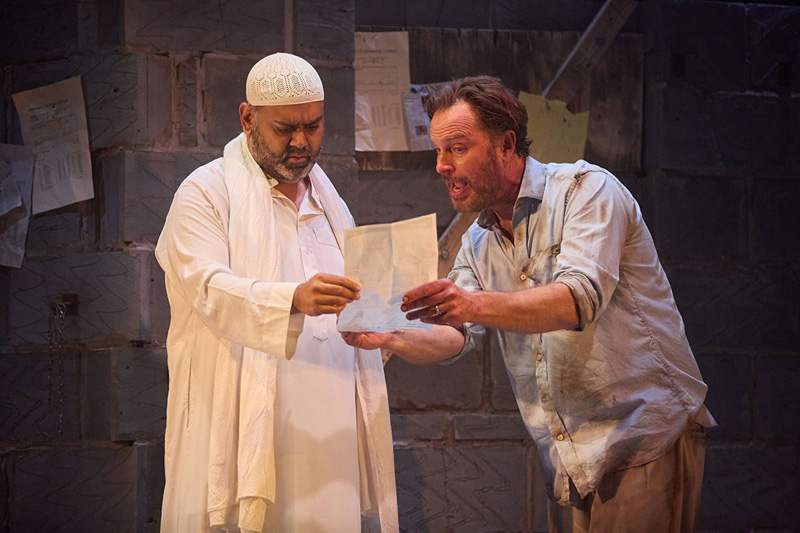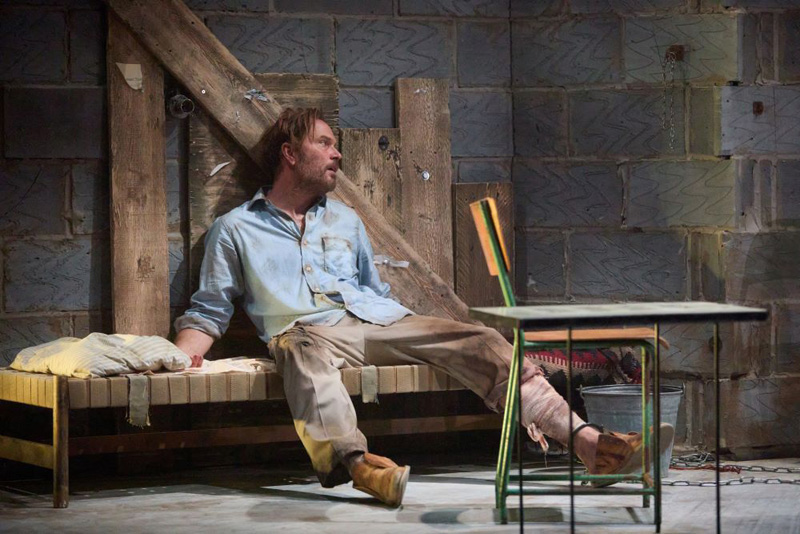“The Invisible Hand”, Tricycle Theatre
Neil Dowden in north London
9 July 2021
Ayad Akhtar is an American writer of Pakistani heritage with his finger on the pulse. His Pulitzer Prize-winning play Disgraced (which was staged at London’s Bush Theatre in 2013) explores Islamophobia in the wake of 9/11. The Invisible Hand, which thrillingly dramatizes the conflict between western style capitalism and Islamic terrorism, was given its British premiere at the Tricycle Theatre in 2016. This summer artistic director Indhu Rubasingham revived her production with three out of the four original cast members at the same venue (now called Kiln Theatre) after Covid lockdown was eased. The play seems at least as pertinent now in its punchy discussion of high finance, politics, religion, and morality.

Tony Jayawardena and Daniel Lapaine in The Invisible Hand. Photo credit: Marc Douet.
Set in Pakistan, the story revolves around American banker Nick Bright, a trader in the region’s futures market, who is kidnapped in mistake for his boss by an Islamist group claiming to represent the people’s interests against government corruption. Although the ten-million-dollar ransom they have demanded will never be paid, Bright persuades the extremist faction’s leader Imam Saleem that he is more valuable alive than dead, since by using his financial acumen he will be able to raise the equivalent money from the stock market within a year.
At times handcuffed and chained to his bed, Nick attempts to forge relationships with his captors and exploit the divisions between them. He befriends the guard Dar and helps him to earn some extra money for his family by selling potatoes where he can get a higher price. Though the violent British-Pakistani Bashir is initially hostile towards Nick, as the American teaches him how to gamble successfully on the stock market and the profits rise using just one laptop in the cell, they start to develop a mutual trust. They have the same temporary objective.

Daniel Lapaine in The Invisible Hand. Photo credit: Marc Douet.
But some of the money they make is secretly taken by Saleem, with tensions coming to a head as he tests Bashir and Dar’s loyalty with a mock execution of Nick. The latter attempts to escape having painstakingly dug a hole through the wall behind his bed with a nail cutter, but he is recaptured. Nick is caught in the middle of a power struggle within the organization, with nobody trusting anyone else. With the Pakistani tax authorities on their tail, he advises Saleem to invest the cash in real estate which inadvertently leads to his downfall as Bashir takes over and puts into practice a horrifyingly extreme version of Nick’s advice of gaining an “edge” through inside knowledge of an event that others don’t yet know about.
The Invisible Hand is an exciting cat-and-mouse game of high stakes which covers some pretty complex ideas. The play’s title refers to a metaphorical phrase used by the economist Adam Smith in 1759 about the unintended social benefits resulting from individuals acting in their own economic self-interest. The post-war Bretton Woods system and Western economic imperialism are touched on, as well as the unacceptable face of capitalism in the form of money laundering, shorting, and currency manipulation, in a knotty morality play wrapped inside a suspenseful thriller. Akhtar shows the ethical ambiguities involved when greedy secularism collides with religious fundamentalism in a clash of civilizations.
Daniel Lapaine conveys both Nick’s sense of desperation as a captive and his arrogance as a citizen of a rules-based democracy (which with his murky financial dealings turns out to be morally bankrupt), while there is a touching scene when he breaks down with emotion when attempting to make a video message for his wife and three-year-old son. New cast member Scott Karim excels as the cockily aggressive Bashir, a fast learner who uses knowledge gained from his teacher to ruthlessly gain power. Tony Jayawardena also impresses as the smoothly menacing Saleem who overestimates his authority. And Sid Sagar plays Dar who is not quite as out of his depth as he seems.
Rubasingham captures the play’s claustrophobic feeling and tense uncertainty within Lizzie Clachan’s single set of an austere concrete breeze-block cell. Lighting designer Oliver Fenwick’s explosive flashes mark the end of scenes before pitch darkness and Alexander Caplen’s atmospheric soundscape includes barking dogs, buzzing insects, and what we later realize are circling US drones waiting to pounce on anyone who looks suspicious.









